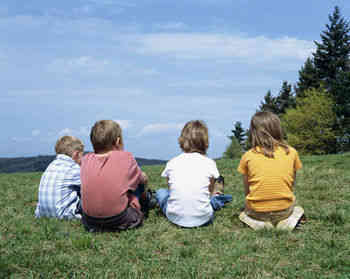大家都说现在的小孩子很幸福,万千宠爱于一身,想要什么就有什么。果真是这样吗?他们知道在游戏中如何爬树翻墙,现实中却可能连成片的树林都没有见过。他们耳边听着世界各地的流行音乐,却从未欣赏过林间小鸟清脆的歌声。这就是我们今天要说的“大自然缺失症”。其实,他们的生活少了很多乐趣。

Relating to contemporary children and young people, nature-deficit disorder refers to the increasing tendency to spend very little time outdoors in the open countryside. The contention is that today's kids do not play and interact with nature in the way that their parents did, instead spending most of their leisure time inside. 21st century kids are more likely to watch TV or play on computers or games consoles. If they do engage in a physical activity, it's likely to be some kind of organized sport under the watchful eye of adults.
“大自然缺失症”指的是现在的青少年到户外、空旷的乡间活动的时间越来越少这样一个趋势。这个说法表达的意思是,现在的孩子不再像他们的父辈那样在大自然里自由玩耍、跟大自然交流了,他们大部分的时间都待在室内。21世纪的孩子们更多的是在看电视、玩电脑或游戏。就算他们参与一些体育活动,很有可能也是有人组织并且在家长的看护下进行的。
The expression nature-deficit disorder was coined in 2005 by American author Richard Louv. The term originates from his bestselling book on the same topic entitled Last Child in the Woods – Saving Our Children from Nature-Deficit Disorder.
“大自然缺失症”(nature-deficit disorder)这个说法是由美国作家理查德•勒夫在2005年提出来的,最早出现在他的同主题畅销书《失去山林的孩子: 拯救大自然缺失症儿童》。
Though this might just appear to be a general observation on the way technology has changed childhood, the premise of nature-deficit disorder goes beyond a simple lack of exposure to the countryside. The suggestion is that this is more like an illness, with symptoms which might include depression, hyperactivity, boredom and loneliness.
虽然这个说法表面上看来只是总结了科技对童年带来的改变,但“大自然缺失症”所传递的信息并不仅仅限于跟大自然接触太少这一事实。这个说法提醒人们,这一状况更像是一种疾病,可能的症状包括抑郁、多动症、无聊以及孤独。
As well as the lure of instant electronic entertainment, suggested causes of nature-deficit disorder include parental fears about traffic and predatory strangers, health and safety rules, and laws against collecting fossils or wild flowers.
引起“大自然缺失症”的原因除了电子娱乐设备的诱惑以外,父母担心孩子出交通意外或被陌生人掳走、健康及安全方面的规定,以及严禁捡拾化石或采摘野花等相关的法律都是导致这一状况出现的原因。
相关阅读
(中国日报网英语点津 Helen 编辑)
